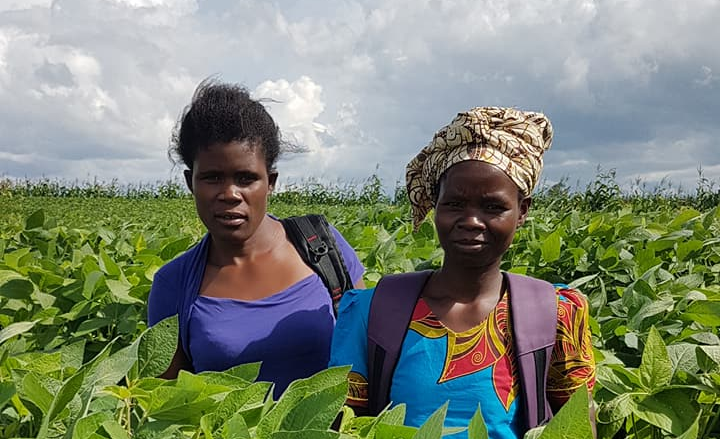The need for Inclusive Businesses to achieve smallholder support commitments under the Malabo Declaration
By Wytske Chamberlain (Greenstick Consulting)
In 2014 the African Union (AU) member states adopted the Malabo Declaration on Accelerated Agricultural Growth and Transformation for Shared Prosperity and Improved Livelihoods (the Malabo declaration). This is an essential document that assists AU member states to achieve agriculture-led growth, and end poverty and hunger. Recently, the second Biennial Review Report was published to track the progress of the member states to achieve the targets set out in the Malabo Declaration. The review concluded that despite some positive progress, “… the continent as a whole is not-on-track to meet the goals and targets of the Malabo Declaration by 2025”. This lack of progress is of great concern for the agricultural sector, and in particular smallholder farmers on the continent, who depend on governments to shape an enabling environment for inclusive agricultural growth. This disappointing performance cannot solely be attributed to the governments who committed themselves to the Malabo Declaration. It is clear that the private sector has a significant responsibility in bringing about inclusive agricultural growth to achieve the envisaged goals. This blog highlights the main entry points for inclusive business (IB) partnerships to play a part in reaching the Malabo Declaration objectives.

The Malabo Declaration commitments are a targeted approach to achieve the agricultural vision for the continent. Using seven thematic areas, it presents a holistic approach for governments to achieve improved livelihoods through agriculture, with a particular emphasis on the role of smallholder farmers. Whereas some of these themes are distinctly policy focused, other themes require contributions from the private sector. These relate to enhancing investment finance, ending hunger, reducing poverty through inclusive agricultural growth and transformation, boosting intra-African trade, and enhancing resilience to climate variability.These themes correspond with the areas where IB partnerships are required to strengthen practices to include smallholder farmers in supply and value chains.
The first option for IB partnerships is access to markets, which works towards the theme of Ending Hunger, measured in terms of performance categories such as ‘access to agricultural inputs’, ‘agricultural productivity’, and ‘post-harvest losses’. A large range of outgrower schemes have been implemented that incorporate input provision for items such as seed and fertiliser. These schemes at the same time enable the outgrowers to sell their crops in commercial value chains. However, partnerships that are more comprehensive are required to make these, and other IB partnership structures, truly inclusive for the contracted smallholders to ensure that these aspects contribute to sustained reduction of hunger levels.
Secondly, IB partnerships can allow smallholders access to technology and knowledge that make them more resilient to adverse climatic circumstances. This can be in the form of drought resistant seeds, irrigation infrastructure, and data platforms, for example. However, products and services that mitigate climatic risks are often designed to suit high-tech farming methods and hence out of reach for smallholder farmers. Inclusive business models can stimulate the adaptation of these products and services to the low-end market segment and operational contexts in which smallholders operate. Alternatively, funding through an IB partnership can make these high-end market offerings accessible and available to smallholder farmers.
The third avenue where IB can contribute to achieving the Malabo Declaration commitments is smallholder financing. The second biennial review report (2019) notes that “With regard to the indicator on increasing access of smallholder farmers […] to, and the use of, financial services for the purposes of transacting agricultural business […], the results suggest a dismal performance”. Large financial institutions offer restricted services based on traditional loan instruments that are not suitable for smallholder farmers. They are also largely absent in IB partnerships between agribusinesses and smallholders. As a result, smallholder financing is often carried out by the agribusinesses within an IB model. Such a financing structure creates severe limits to the scalability of these initiatives, is often unsustainable, and hold little value for smallholder farmers if such a partnership comes to an end. Furthermore, private sector financing is required to fund instruments for climate resilience. Innovative financing approaches in wider IB partnerships are essential to bring about the sustained growth of smallholder activities required to reach the Malabo Declaration commitments.
The overall disappointing conclusion from the second biennial review is a clear call to action. Foremost to the governments who have committed themselves to this initiative. They have to dedicate incentives, finances, and resources needed to achieve the set goals. However, governments require the support and commitment from the private sector to make transformative change happen on the ground. Inclusive partnerships that bring together smallholder farmers, commercial agri-businesses, financing institutions, and other stakeholders, and that operate in a supportive policy environment, are crucial to grow the agricultural sector, improve livelihoods, and reduce poverty and hunger. It is time for business to start sharing the responsibility, and take innovative steps forward with practical and tangible action, with the urgency, fairness and ambition that will not only ultimately benefit them as a sustainable business, but also unlock opportunities for the smallholder farming segment. Achieving the Malabo Declaration goals should be a collective effort between governments and inclusive businesses to collate resources, support innovation and enable sustainable development that brings about concrete and meaningful benefits for all.
Note: I would like to thank Karin Kleinbooi (Senior Programme Manager, Solidaridad Southern Africa) for her contributions to this blog. Photos provided by Solidaridad Southern Africa.
